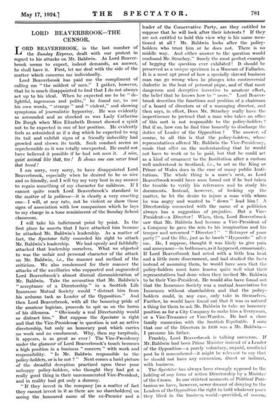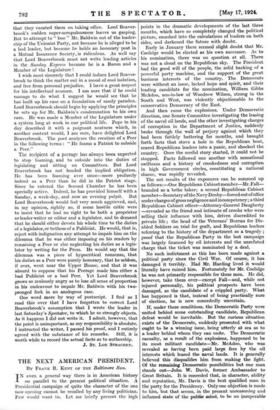LORD BEAVERBROOK—THE CENSOR.
ORD BEAVERBROOK, in the last number of ■ the Sunday Express, dealt with our protest in regard to his attacks on Mr. Baldwin. As Lord Beaver- brook seems to expect, indeed demands, an answer, he shall have it. First, let me deal with the side of the matter which concerns me individually.
Lord Beaverbrook has paid me the compliment of calling me " the mildest of men." I gather, however, that he is much disappointed to find that I do not always act up to his ideal. When he expected me to be " de- lightful, ingenuous and polite," he found me, to use his own words, " strange " and " violent," and showing symptoms of journalistic hypocrisy. He was evidently as astounded and as shocked as was Lady Catherine De Burgh when Miss Elizabeth Bennet showed a spirit not to be expected in one of her position. He evidently feels as astonished as if a dog which he expected to wag its tail and exhibit signs of a friendly imbecility had growled and shown its teeth. Such conduct seems as reprehensible as it was totally unexpected. He could not have believed it possible if he had not seen it. A nice, quiet animal like that, too ! It shows one can never trust that breed !
I am sorry, very sorry, to have disappointed Lord Beaverbrook, especially when he desired to be so nice and so friendly, and I will try my very best in my answer to regain something of my character for mildness. If I cannot quite reach Lord Beaverbrook's standard in the matter of la politesse—it is clearly a very exacting one-- I will, at any rate, not be violent or show those signs of association with low companions which he lays to my charge in a tone reminiscent of the Sunday School classroom.
I will take his indictment point by point. In the first place he asserts that I have attacked him because he attacked Mr. Baldwin's leadership. As a matter of fact, the Spectator fully conceded his right to attack Mr. Baldwin's leadership. We had openly and faithfully attacked that leadership ourselves. What we objected to was the unfair and personal character of the attack on Mr. Baldwin, i.e., the manner and method of the criticism. We also condemned for their manner the attacks of the auxiliaries who supported and augmented Lord Beaverbrook's almost diurnal disconsideration of Mr. Baldwin. Take the accusation that Mr. Baldwin's " acceptance of a Directorship " in a Scottish Life Insurance Mutual Society would " distract him from his arduous task as Leader of the Opposition." And then Lord Beaverbrook, with all the bouncing pride of the amateur logician, proceeds to spit us on the horns of his dilemma. " Obviously a real Directorship would so distract him." But suppose the Spectator is right and that the Vice-Presidenoy in question is not an active directorship, but only an honorary post which carries no work and no emolument. Why, then my turpitude, it appears, is as great as ever I The Vice-Presidency under the glamour of Lord Beaverbrook's touch becomes a high position in a business " concern " with work and responsibility. " Is Mr. Baldwin responsible to the policy-holders, or is he not ? " Next comes a lurid picture of the dreadful deception practised upon these poor unhappy policy-holders, who thought they had got a really good thing in their unremunerated Vice-President, and in reality had got only a dummy.
" If they invest in the company [as a matter of fact they cannot invest in it as there are no shareholders] on seeing the honoured name of the ex-Premier and a leader of the Conservative Party, are they entitled to suppose that he will look after their interests ? If they are not entitled to hold this view why is his name men- tioned at all ? Mr. Baldwin looks after the policy- holders who trust him or he does not. There is no middle way. And either answer to the question would confound Mr. Strachey." Surely the most perfect example of begging the question ever exhibited ! It should be preserved as a unique specimen in a Museum of Fallacies.
It is a most apt proof of how a specially shrewd business man can go wrong when he plunges into controversial dialectic in the heat of personal pique, and of that most dangerous and deceptive incentive to amateur effort, the belief that he knows how to " score." Lord Beaver- brook describes the functions and position of a chairman of a board of directors or of a managing director, and then says, in effect, Does Mr. Strachey really have the impertinence to pretend that a man who takes an office of this sort is not responsible to the policy-holders ? But if so, how can he find time honestly to discharge the duties of Leader of the Opposition ? The answer, of course, to all this is that the policy-holders, whose representatives offered Mr. Baldwin the Vice-Presidency, made that offer on the understanding that he would not have to work or to be paid, but that he could act as a kind of ornament to the Institution after a custom well understood in Scotland, i.e., to act as the King or Prince of Wales does in the case of many public Insti- tutions. The whole thing is a mare's nest, as Lord Beaverbrook would have soon found out if he had taken the trouble to verify his references and to study his documents. Instead, however, of looking up the matter, he let the desire to injure a man with whom he was angry and wanted to " down " lead him ! A Directorship connected with the name of a politician always has a suggestion of prejudice. But a Vice- President=a Director ! When, then, Lord Beaverbrook saw that Mr. Baldwin had become a Vice-President of a Company he gave the rein to his imagination and his temper and screamed " Director ! " " Betrayer of your party!" and the like, just as he bawls "Hypocrite" after me. He, I suppose, thought it was likely to give pain and annoyance—in both cases, as it happened, erroneously.
If Lord Beaverbrook had acted with a little less heat and a little more discernment, and had studied the facts instead of assuming them, he would have seen that the policy-holders must have known quite well what their representatives had done when they invited Mr. Baldwin to be their Vice-President. He would also have found out that the Insurance Society was a mutual Association for Insurance without shareholders and that the policy- holders could, in any case, only take in themselves.
Further, he would have found out that it was as natural a thing for them to ask Mr. Baldwin to take an honorary position as for a City Company to make him a liveryman, or a Vice-Treasurer or Vice-Warden. He had a close family connexion with the Scottish Equitable. I note that one of the Directors in 1898 was a Mr. Baldwin— I presume his father.
Frankly, Lord Beaverbrook is talking nonsense. If Mr. Baldwin had been Prime Minister instead of a Leader of the Opposition—a purely voluntary, unpaid, unofficial post be it remembered—it might be relevant to say that he should not have any connexion, direct or indirect:, with business.
The Spectator has always been strongly opposed to the holding of any form of active Directorship by a Minister of the Crown. In our strictest moments of Political Puri- tanism we have, however, never dreamt of denying to the Leaders of the Opposition the right to hold whatever posts they liked in the business world—provided, of course. that they vacated them on taking office. Lord Beaver- brook's sudden super-scrupulousness leaves us gasping. But to attempt to " boo " Mr. Baldwin out of the leader- ship of the Unionist Party, not because he is alleged to be a bad leader, but because he holds an honorary post in a Mutual Insurance Society, is ridiculous. As well say that Lord Beaverbrook must not write leading articles in the Sunday Express because he is a Baron and a Member of the Legislature !
I wish most sincerely that I could induce Lord Beaver- brook to think the matter out in a mood of cool isolation, and free from personal prejudice. I have a great respect for his intellectual acumen. I am sure that if he could manage to do what I suggest he would see that he has built up his case on a foundation of sandy paradox. Lord Beaverbrook should begin by applying the principles he sets up for Mr. Baldwin's condemnation to his own case. He was made a Member of the Legislature under a system long at work in our political life. Pope in his day described it with a poignant neatness which, in another context would, I am sure, have delighted Lord Beaverbrook. The poet analyzes the creation of a Peer in the following terms : " He foams a Patriot to subside a Peer."
The recipient of a peerage has always been expected to stop foaming, and to subside into the duties of legislating and sitting on Committees. But Lord Beaverbrook has not heeded the implied obligation. He has been foaming ever since—more profusely indeed as a Peer than he did in the Patriot stage. Since he entered the Second Chamber he has been specially active. Indeed, he has provided himself with a Sunday, a week-day, and now an evening pulpit. But Lord Beaverbrook would feel very much aggrieved, and, in my opinion, rightly so, if some hostile critic were to insist that he had no right to be both a proprietor or leader writer or editor and a legislator, and to demand that he should either devote his whole time to the duties of a legislator, or to those of a Publicist. He would, that is, reject with indignation any attempt to impale him on the dilemma that he was either imposing on his readers by remaining a Peer or else neglecting his duties as a legis- lator by writing for the Press. He would say that the dilemma was a piece of hypocritical nonsense, that his duties as a Peer were purely honorary, that he seldom, if ever, went near the Upper House, and that it was absurd to suppose that his Peerage made him either a bad Publicist or a bad Peer. Yet Lord Beaverbrook grows so zealously angry as to lose all sense of proportion in his endeavour to impale Mr. Baldwin with his two- pronged fork in an analogous case.
One word more by way of postscript. I find as I read this over that I have forgotten to correct Lord Beaverbrook's assumption that I wrote the leader in last Saturday's Spectator, to which he so strongly objects. As it happens I did not write it. I admit, however, that the point is unimportant, as my responsibility is absolute. I instructed the writer, I passed his proof, and I entirely agreed with the substance of his remarks. Still, it is worth while to record the actual facts as to authorship.
J. ST. LOE STRACHEY.



















































 Previous page
Previous page